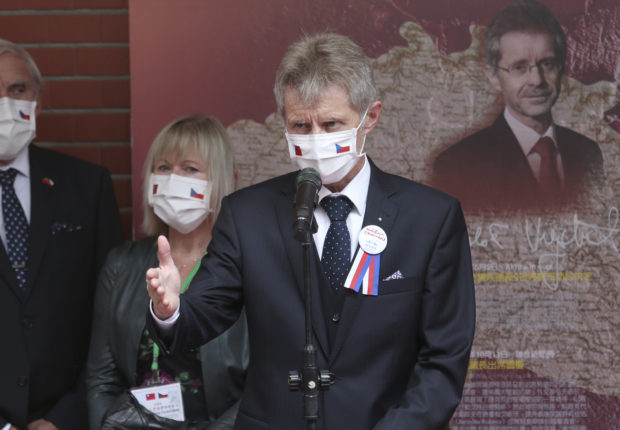Czech Senate president meets Taiwan leader; Beijing protests

The Czech Senate President Milos Vystrcil answers questions from the media after he delivered a keynote speech at Legislative Yuan in Taipei, Taiwan, Tuesday, Sept. 1. 2020. Vystrcil arrived in Taiwan on Sunday accompanied by Prague Mayor Zdenek Hrib and more than 80 representatives from government, business, and academia on a 6-day visit. (AP Photo/Chiang Ying-ying)
TAIPEI, Taiwan — The Czech Senate president met with Taiwanese leader Tsai Ing-wen on Thursday morning during a rare trip by a foreign dignitary to the self-ruled democratic island that rival China called an “open provocation.”
Tsai presented a medal for Jaroslav Kubera, the recently deceased predecessor of Czech Senate President Milos Vystrcil.
Kubera died in January before making the trip and Vystrcil said China’s pressure, including a warning from the Chinese Embassy against congratulating Tsai on her reelection, contributed to his decision to travel to the island.
Tsai called Kubera a “great friend” and gave a nod to Vystrcil’s speech Tuesday, saying his words “I’m a Taiwanese” had touched many hearts.
“Our actions are telling friends in Europe and all over the world, whether Taiwanese or Czechs, we will not succumb to oppression, will bravely speak up, actively participate in international affairs, and contribute our capabilities,” she said.
Article continues after this advertisementBeijing is furious about the Czech delegation’s visit, with the foreign ministry summoning the Czech Republic’s ambassador to lodge stern representations and saying the trip amounted to “flagrant support of Taiwan independence.” China claims Taiwan as its own territory and strongly objects to any official contact between other countries and the self-governing island.
Article continues after this advertisementChina’s Foreign Minister Wang Yi said on Tuesday that Vystrcil’s visit is an “open provocation.”
“China must tell the Czech Senate leader: You’ve crossed the line!” Wang said.
Tensions between the Czech Republic and China have simmered since last year, tracing back to a dispute between Beijing and Prague. The two capitals ended a sister-cities agreement because Beijing had wanted Prague to agree to the “One China” principle, which says Taiwan is part of China.
In his address on Tuesday, Vystrcil directly referenced former President John F. Kennedy’s famed 1963 anti-communist speech in then-divided Berlin, and emphasized democratic freedoms embraced since the Czech Republic threw off communist rule at the end of the Cold War and Taiwan emerged from martial law at the end of the 1980s.
“In 1963, the American president JFK, in his famous speech ‘I’m a Berliner,’ clearly opposed communism and political oppression and supported the people of West Berlin,” Vystrcil said. “He said ‘Freedom is indivisible, and when one man is enslaved, all are not free.'”
“Please let me use the same manner to express my support to the people of Taiwan: I’m a Taiwanese,” he said, speaking the last phrase in Mandarin Chinese.